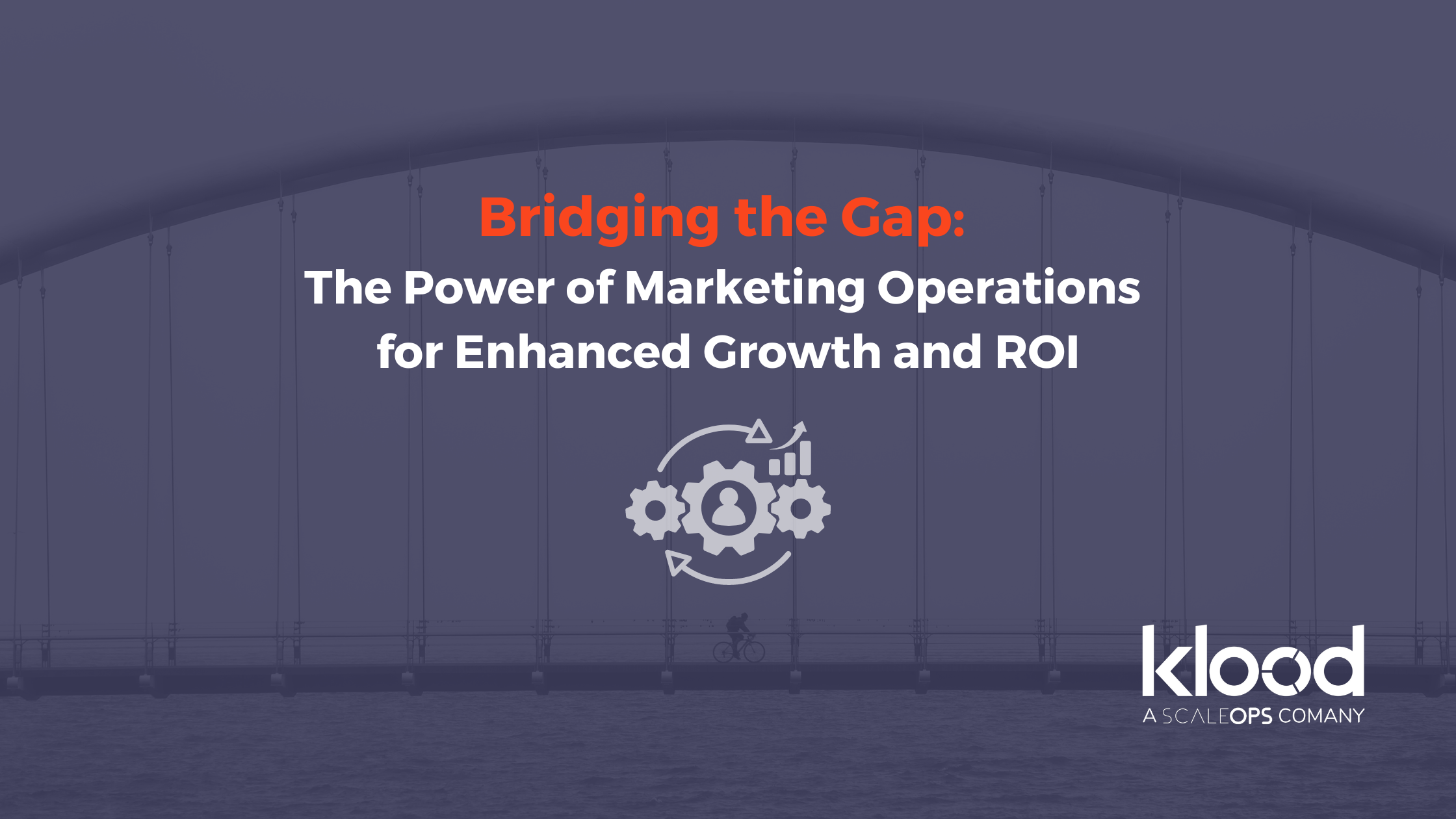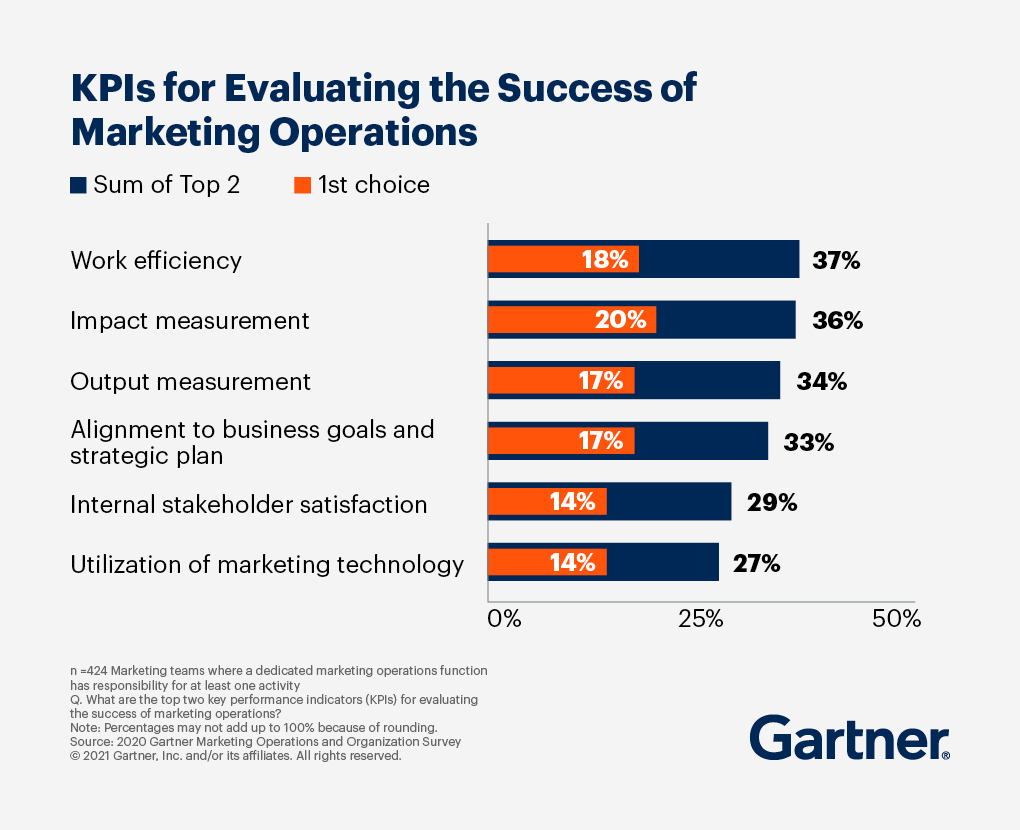
Get weekly
HubSpot updates
Marketing is a super dynamic role where continuous learning is the name of the game. But there’s no denying that things are getting more and more complex, and to achieve the ambitious goals your organisation has set, your marketing department needs a broad range of technical, strategic, and creative skills that take years to acquire, frequent updating, and a very specific aptitude to master.
Many factors could impact your marketing team’s performance, but more often than not, productivity and progress are hindered by the overwhelming amount of tasks that now fall in the realm of the marketing role — not to mention that these tasks have to be executed using multiple different systems that are often not set up to communicate with one other effectively.
In this blog, we're going to break down the concept of marketing operations and how it serves as the ultimate bridge to connect different teams and functions within your marketing department. Think of it as the secret sauce that keeps the gears turning smoothly and amplifies your overall impact.
Why are Marketing Operations having a moment?
Digital marketing has many moving pieces, each needing to be monitored, reported on, and optimised. Delivering hyper-personalised customer experiences (CX), along with a smooth and profitable customer journey, is a full-time job.
Do not be fooled into thinking that once you set your workflows and turn on your email nurtures, you can leave the machine to operate unmanned. A tonne of expertise is required to ensure that your inbound strategy can come to life, stay alive, and thrive.
That’s why making a clear distinction between the broader realm of marketing management and the more targeted role of marketing operations management is essential. Many organisations don’t yet realise that this is the missing link. Broadly speaking, there are at least six signs that your organisation would strongly benefit from marketing operations:
.png?width=800&height=2000&name=5%20Signs%20Your%20Business%20needs%20MOps%20(1).png)
This list could go on. But really, what it comes down to is if someone in your organisation isn’t taking ownership of the operational side of marketing, in particular, managing and optimising your CRM, you’re pouring petrol into a diesel engine, and sooner or later, the car will grind to a halt.
If you’re using a powerful tool like HubSpot, you’re probably collecting (and hoarding) a tonne of data. But by not making fast and impactful decisions based on this data and then quickly implementing an action plan using the latest best practices, you’re only going to get frustrated with the lack of ROI from this tool.
Understanding Marketing Operations
First things first, what is marketing operations? Well, it's the beating heart of your marketing engine – the strategic and tactical powerhouse that fuels your entire marketing machinery. Marketing operations involve the planning, execution, and optimisation of all marketing activities within an organisation.
But here's the kicker: Marketing operations aren’t just about one specific function or team. It's the glue that brings everything (and everyone) together. Picture it as the ultimate harmoniser, ensuring seamless collaboration and integration across the board.
Think about it like this: You have your creative team brainstorming compelling campaigns, your data wizards crunching numbers for insights, your technology gurus implementing and managing marketing tools, and your analytics mavens tracking performance. A marketing operations manager will bring all these moving parts together and align their efforts to create a unified marketing strategy that drives results.
If you’re trying to manage all of your complex marketing operations without a dedicated specialist, you may encounter some significant challenges and find yourself juggling multiple responsibilities, struggling to optimise processes, and dealing with disjointed workflows.
A marketing operations manager will handle data management and analytics to streamline processes and foster collaboration within your team. However, this requires a deep level of expertise and a comprehensive understanding of the ever-evolving marketing landscape.
As your business scales (or if it aims to accelerate growth), you truly run the risk of inefficiency, misalignment, and missed opportunities without someone to pick up the operational pieces of your marketing strategy.
To understand exactly how a marketing operations manager can bridge the gaps in the implementation of your inbound strategy, let’s take a look at the key responsibilities they’re likely to handle:
Key responsibilities of a Marketing Operations Manager:
- Strategic planning: Collaborate with the marketing leadership team to develop and implement strategic plans and objectives.
- Process optimisation: Identify areas for improvement in marketing processes, workflows, and systems to drive efficiency and effectiveness.
- Marketing technology management: Evaluate, implement, and manage marketing technology tools and platforms to support marketing initiatives.
- Marketing automation: Implement and optimise marketing automation systems to streamline processes and nurture leads.
- Campaign management: Oversee the planning, execution, and optimisation of marketing campaigns, ensuring alignment with objectives and target audiences.
- Data analysis and reporting: Analyse marketing data and metrics to derive insights, measure performance, and report on key marketing KPIs.
- Budgeting and resource allocation: Manage the marketing budget, allocate resources effectively, and optimise spending to maximise ROI.
- Cross-functional collaboration: Foster collaboration and effective communication among marketing teams, sales, IT, finance, and other stakeholders.
- Analytics and measurement: Establish metrics, track campaign performance, conduct A/B testing, and make data-driven decisions to optimise results.
- Training and enablement: Provide training and support to marketing teams on tools, processes, and best practices.
- Compliance and governance: Ensure compliance with marketing regulations, data privacy laws, and company policies.
These responsibilities align with the KPIs for evaluating the success of marketing operations, as depicted by Gartner.

How does Marketing Operations bring it all together?
In any organisation, there’s often a lot of talk about process alignment and collaboration. But let’s be honest, how many companies are truly achieving this, and in particular with marketing and sales?
A marketing operations specialist will look at your business objectives and map the marketing processes necessary to meet these objectives. Here's how they accomplish this:
-
Form a close partnership with marketing leaders and stakeholders
To understand the strategic direction of your business, a marketing operations specialist will communicate and work closely with team members across all levels of an organisation. They will then take their learnings and align processes, campaigns, and initiatives to ensure that marketing efforts are purposeful and contribute to the organisation’s success.
Formulation and implementation of standardised best practices
In marketing, everything needs to not only be repeatable but also easy to optimise. That’s why a marketing operations specialist will work with you to develop and document workflows, guidelines, and templates that streamline operations and ensure consistency. By establishing standardised processes and best practices within your marketing organisation, every action will be optimised for efficiency and aligned with the desired branding and messaging.
Facilitate collaboration
Effective collaboration among different teams and departments is essential for successful marketing operations. Your marketing operations specialist will encourage open communication, facilitate regular meetings, and create platforms for cross-functional collaboration, such as shared project management tools or communication channels.
Share and leverage data and insights
The marketing operations specialist facilitates the sharing of data, insights, and performance metrics among teams and departments. They create centralised reporting systems and dashboards that provide visibility into marketing performance, campaign results, and customer behaviour. By sharing these insights, they enable teams to make data-driven decisions, improve collaboration, and align efforts for better outcomes.
By bringing visibility, alignment, and attention to these key areas, a marketing operations specialist orchestrates efficient processes that help businesses get to their goals faster.
Maximising ROI from HubSpot with Marketing Operations
Marketing professionals often face a common predicament: underutilising the vast potential of the HubSpot platform. Despite its robust features and capabilities, the fast-paced nature of business often leaves us with limited time to become HubSpot experts. This can lead to disappointment, as we miss out on the full range of benefits that HubSpot, the industry-standard tool for end-to-end revenue operations and one of the most popular CRMs, offers.
If you decide to work with a HubSpot marketing operations specialist, you’ll quickly realise that the remarkable results you were after are very much within reach. You no longer have to worry about the knowledge gaps on your team or that you don’t have time to explore each function of the platform. Whether outsourced or in-house, a marketing operations manager who is well-versed in HubSpot will ensure that each feature and capability is utilised strategically and efficiently. Here’s how:
-
Streamlining your marketing efficiency
Maybe you’ve got a few campaigns on the go, and you’re using some of HubSpot’s automation features. You’re well aware, however, that there’s so much more you could be doing to optimise each activity. Perhaps you’re overlooking some alerts and not handling errors on time; this, in turn, is affecting the customer journey and causing bottlenecks in your marketing funnel. A marketing operations specialist will audit your HubSpot portal to ensure that manual efforts are minimised, and all the processes you have going in HubSpot are working effectively to generate and deliver marketing-qualified leads (MQLs) to your sales team.
-
Unveiling the secrets hidden in your HubSpot data
You probably know that HubSpot is amazing at collecting data. One of the trickier aspects, however, is analysing and reporting on that data. HubSpot’s analytics tool can tell you so much about campaign performance, lead generation, and customer engagement. And with someone implementing robust analytics practices, you can gain an even deeper understanding of your marketing efforts and customer interactions. From building reports to creating dashboards, your marketing operations guru will simplify how you extract and interpret data from HubSpot.
From chaos to campaign excellence
HubSpot portals can get messy. Trying to execute and manage well-choreographed campaigns in an organised HubSpot portal can be a huge challenge. A marketing operations specialist can maximise your content assets and ensure that your campaigns function well and generate the leads you’d hoped to see. By optimising your campaign management, you’re far more likely to achieve worthwhile results. This could mean something as simple as reviewing each step in a workflow to ensure that communication is reaching leads and prospects at optimal moments, or finding the right integrations to bring more creative elements into your strategy.
Integration and data centralisation
HubSpot gives you a big-picture view of your marketing operations and helps you visualise your systems. But before you can get these holistic insights, you’ll have to integrate all of the tools you use in order to centralise the data. With HubSot’s integration capabilities, you can finally make your entire marketing stack work together. But the actual process of integrating all the platforms you use and getting them to talk to each other correctly is a tricky task and one that your marketing operations specialist will happily take on.
A Journey of Growth and Success
A marketing operations manager is a bit like a constant gardener. They are the custodians of the perpetual tasks that generate revenue for your business through process optimisation.
By now, you may recognise that a marketing operations specialist is the missing link you’ve been searching for — especially if you, like many others in your shoes, are overburdened by the technical side of trying to implement and manage your marketing strategies.
By analysing your marketing operations regularly, a specialist can help you uncover areas of inefficiency and make data-driven optimisations that really count, reducing costs and amplifying output with smart and elegant solutions.
If you’re keen to learn more and would like to find out how Klood can help you fine-tune your strategies and generate a higher ROI from HubSpot, let’s have a chat. Our marketing operations specialists can work as part of your team to solve any challenges you may be facing while using the HubSpot platform, or we can build a long-term partnership where we manage your HubSpot portal and support you to deliver growth and profit for your business.

